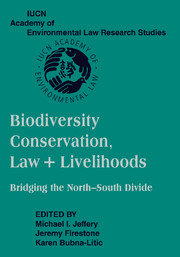 Biodiversity Conservation, Law and Livelihoods: Bridging the North-South Divide
Biodiversity Conservation, Law and Livelihoods: Bridging the North-South Divide Published online by Cambridge University Press: 31 July 2009
The threats to biological diversity are well known, and include overharvesting of flora and fauna, species introductions, habitat loss and fragmentation, pollution, tourism, globalization, and climate change. These factors threaten the sustainability of culture as well. This volume, addressing as it does the conservation of biodiversity and the divide between developed and developing states, appropriately focuses international and comparative environmental law scholars, practitioners, and policy makers on ways to engage cooperatively to meet the broader imperatives of a sustainable biosphere and sustainable cultures. It also usefully ties these concepts together in one volume given the interrelationship between the two. The tension between nature conservation, on the one hand, and sustainable cultures, on the other, is perhaps best reflected in international law by section 8(j) of the 1992 Convention on Biological Diversity (CBD). There states are called on to conserve biological diversity and to “respect, preserve, and maintain” indigenous cultures while at the same time promoting the wider sustainable use of the components of biological diversity. Appropriately, the Convention recognizes that the conservation of biological diversity is a “common concern of humankind.” We would suggest that sustainable cultures should likewise be recognized. It is to these twin goals – rather, obligations – that we now turn.
This book places the issues threatening biological diversity – the variability of life on Earth and their interaction at the level of genes, species, and ecosystems – in a contemporary context.
To save this book to your Kindle, first ensure [email protected] is added to your Approved Personal Document E-mail List under your Personal Document Settings on the Manage Your Content and Devices page of your Amazon account. Then enter the ‘name’ part of your Kindle email address below. Find out more about saving to your Kindle.
Note you can select to save to either the @free.kindle.com or @kindle.com variations. ‘@free.kindle.com’ emails are free but can only be saved to your device when it is connected to wi-fi. ‘@kindle.com’ emails can be delivered even when you are not connected to wi-fi, but note that service fees apply.
Find out more about the Kindle Personal Document Service.
To save content items to your account, please confirm that you agree to abide by our usage policies. If this is the first time you use this feature, you will be asked to authorise Cambridge Core to connect with your account. Find out more about saving content to Dropbox.
To save content items to your account, please confirm that you agree to abide by our usage policies. If this is the first time you use this feature, you will be asked to authorise Cambridge Core to connect with your account. Find out more about saving content to Google Drive.